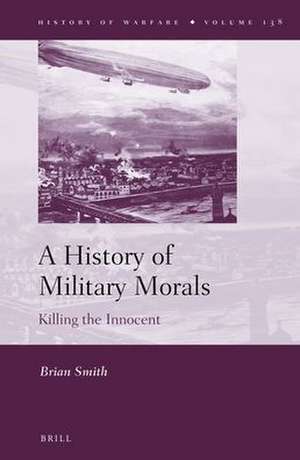A History of Military Morals: Killing the Innocent: History of Warfare, cartea 138
Autor Brian Smithen Limba Engleză Hardback – 20 apr 2022
Din seria History of Warfare
- 18%
 Preț: 1498.42 lei
Preț: 1498.42 lei - 18%
 Preț: 557.09 lei
Preț: 557.09 lei - 18%
 Preț: 1163.81 lei
Preț: 1163.81 lei - 18%
 Preț: 991.78 lei
Preț: 991.78 lei - 18%
 Preț: 1006.43 lei
Preț: 1006.43 lei - 18%
 Preț: 973.93 lei
Preț: 973.93 lei - 15%
 Preț: 609.61 lei
Preț: 609.61 lei - 18%
 Preț: 1504.70 lei
Preț: 1504.70 lei - 18%
 Preț: 1063.77 lei
Preț: 1063.77 lei - 18%
 Preț: 1002.49 lei
Preț: 1002.49 lei - 18%
 Preț: 676.64 lei
Preț: 676.64 lei - 18%
 Preț: 736.97 lei
Preț: 736.97 lei - 18%
 Preț: 647.60 lei
Preț: 647.60 lei - 18%
 Preț: 967.49 lei
Preț: 967.49 lei - 18%
 Preț: 606.50 lei
Preț: 606.50 lei - 18%
 Preț: 661.66 lei
Preț: 661.66 lei - 18%
 Preț: 946.29 lei
Preț: 946.29 lei - 15%
 Preț: 504.89 lei
Preț: 504.89 lei - 18%
 Preț: 762.09 lei
Preț: 762.09 lei - 18%
 Preț: 612.62 lei
Preț: 612.62 lei - 18%
 Preț: 849.67 lei
Preț: 849.67 lei - 18%
 Preț: 1715.05 lei
Preț: 1715.05 lei - 18%
 Preț: 1253.09 lei
Preț: 1253.09 lei - 18%
 Preț: 1123.29 lei
Preț: 1123.29 lei - 18%
 Preț: 792.82 lei
Preț: 792.82 lei - 18%
 Preț: 707.43 lei
Preț: 707.43 lei - 18%
 Preț: 688.71 lei
Preț: 688.71 lei - 18%
 Preț: 728.25 lei
Preț: 728.25 lei - 18%
 Preț: 577.99 lei
Preț: 577.99 lei - 18%
 Preț: 849.11 lei
Preț: 849.11 lei - 18%
 Preț: 827.11 lei
Preț: 827.11 lei - 18%
 Preț: 936.69 lei
Preț: 936.69 lei - 18%
 Preț: 1139.79 lei
Preț: 1139.79 lei - 18%
 Preț: 820.89 lei
Preț: 820.89 lei - 18%
 Preț: 953.44 lei
Preț: 953.44 lei - 18%
 Preț: 803.22 lei
Preț: 803.22 lei - 18%
 Preț: 1358.83 lei
Preț: 1358.83 lei - 18%
 Preț: 560.98 lei
Preț: 560.98 lei - 18%
 Preț: 892.21 lei
Preț: 892.21 lei - 18%
 Preț: 778.50 lei
Preț: 778.50 lei - 18%
 Preț: 679.63 lei
Preț: 679.63 lei - 18%
 Preț: 595.92 lei
Preț: 595.92 lei - 18%
 Preț: 1333.98 lei
Preț: 1333.98 lei - 18%
 Preț: 803.22 lei
Preț: 803.22 lei - 18%
 Preț: 556.86 lei
Preț: 556.86 lei - 18%
 Preț: 1491.16 lei
Preț: 1491.16 lei - 18%
 Preț: 967.34 lei
Preț: 967.34 lei - 18%
 Preț: 841.96 lei
Preț: 841.96 lei - 18%
 Preț: 842.98 lei
Preț: 842.98 lei
Preț: 801.66 lei
Preț vechi: 977.63 lei
-18% Nou
Puncte Express: 1202
Preț estimativ în valută:
153.39€ • 160.16$ • 126.96£
153.39€ • 160.16$ • 126.96£
Carte indisponibilă temporar
Doresc să fiu notificat când acest titlu va fi disponibil:
Se trimite...
Preluare comenzi: 021 569.72.76
Specificații
ISBN-13: 9789004513433
ISBN-10: 9004513434
Pagini: 480
Dimensiuni: 155 x 235 mm
Greutate: 0 kg
Editura: Brill
Colecția Brill
Seria History of Warfare
ISBN-10: 9004513434
Pagini: 480
Dimensiuni: 155 x 235 mm
Greutate: 0 kg
Editura: Brill
Colecția Brill
Seria History of Warfare
Notă biografică
Brian Smith, Ph.D. (2016), Boston University, is an Assistant Professor of Political Science at Nazarbayev University. He has published many articles on intellectual history and a monograph, John Locke, Territory, and Transmigration (Routledge, 2021).
Cuprins
List of Figures
Introduction
1 Introduction
2 Theory of Moral Development
3 Methodology
4 Overview of Chapters
PART 1: Killing the Innocent: Three Discursive Traditions from the Sixteenth to Eighteenth Centuries
1 The Origins of Double Effect: The Scholastic Tradition
1 Recovering the Primitive Christian Tradition
2 Before Double Effect
3 The Rise of Double Effect
4 Killing the Innocent
5 Killing the Innocent after Aquinas
6 Repurposing Double Effect in the Sixteenth Century
7 Sixteenth- and Seventeenth-Century Scholastics on Siege Warfare
8 English and Scottish Protestants
9 Conclusion
2 Martialists: Soldiers and Tacticians
1 Introduction
2 Early Martialists
3 Seventeenth-Century Martialists
4 Shifts in the Martialist Tradition
5 Conclusion
3 Humanists and Republicans
1 Introduction
2 Machiavelli
3 Erasmus
4 Gentili
5 Grotius
6 Pufendorf
7 Jeremy Taylor
8 George Dawson
9 Christian Wolff
10 Vattel
11 Conclusion
PART 2: The Nineteenth Century
4 Killing Noncombatants in the Nineteenth Century
1 Introduction
2 Counting Casualties
3 Noncombatants
4 Sovereignty and Self-Preservation
5 Utilitarianism
6 The Link between Philosophical Utilitarianism and Military Necessity
7 Conclusion
5 Deliberately Targeting Noncombatants
1 Introduction
2 Enduring the Hardships of War: Laying Waste
3 Laying Waste and the Laws of War
4 Starvation and Blockades
5 Sieges
6 Siege and the Laws of War
7 Reprisal, Retaliation, Retorsion
8 Change in Norms
9 The Spatial Dimension of Noncombatant Death
10 Noncombatant Death in the Early Twentieth Century
11 Military Manuals
12 Conclusion
PART 3: The Twentieth Century: Aerial Bombing and a Shift in Norms
6 New Possibilities and Problems: Aeronauts, Inventors, and Future-War Fiction on Aerial Bombing
1 Early Experiments
2 Deterrence, Annihilation, or Nonfactor?
3 Future-War Fiction
4 Conclusion
7 Interwar Approaches to Bombing: Two Discursive Traditions
1 Introduction
2 Interwar Period Debates on Aerial Bombing
3 International Liberals: Regulation and Disarmament
4 Bombing Realists
5 Strategic versus Terror Bombing
6 Conclusion
8 The Return to Intention: Post World War I
1 Introduction
2 German Guilt
3 The Laws of Humanity and Intentional Harm
4 The Return of the Scholastics
5 The Rediscovery of Vitoria and Suarez
6 Catholics against Bombing
7 Conclusion
9 Postscript: Intention in the Twenty-First Century
1 Introduction
2 Intention and Folk Psychology
3 Are Intentions Relevant for Twenty-First Century War?
Bibliography of Primary Sources 445
Prior to the Sixteenth Century
The Sixteenth Century
The Seventeenth Century
The Eighteenth Century
The Nineteenth Century
Index
